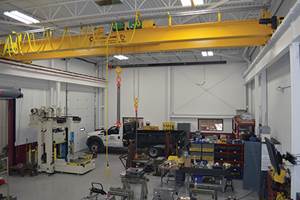Benefiting from an Owner-Only 401(k)
For independent moldmakers, a retirement plan provides advantages when building a nest egg.
In the past, small business owners have not had many choices for retirement plans and 401(k)s seemed too complicated and expensive. This is no longer the case. Small business owners may now be eligible for an owner-only 401(k)-a relatively new option for those who would like to set up a retirement plan.
Any type of small business, including partnerships and sole-proprietorships, can participate in an owner-only 401(k) plan, as long as there are not any other eligible employees except spouses. For independent moldmakers, this may be a good retirement plan option.
The greatest advantage of an owner-only 401(k) is the contribution limit. With this type of plan, you are able to contribute up to $12,000 per year to your nest egg. In addition, as an employer, you can make contributions to your plan up to 25 percent of your total eligible salary. One thing to keep in mind is that your personal contributions and your employer contributions cannot exceed $40,000 in any given year.
Another benefit of owner-only 401(k)s is eligibility for the catch-up provision-a provision that allows investors approaching retirement to make extra contributions. This means that in 2003 individuals over the age of fifty can contribute an additional $2,000 per year, for a total of $14,000. Also, catch-up contributions are not included in the $40,000 limit, enabling you to contribute as much as $42,000 if you are eligible.
Here is an example of how an owner-only 401(k) compares with other popular retirement plans for small business owners. You own an incorporated business and you earned $100,000 in salary this year. With a SEP-IRA plan, you would be able to contribute up to $25,000 toward your retirement savings. If you had a SIMPLE-IRA plan, you would only be able to contribute up to $11,000 annually. However, with an owner-only 401(k), you would be able to contribute up to $37,000 per year (25 percent of the $100,000 salary plus your personal contribution of $12,000) to your retirement fund, increasing the compounding power of your nest egg.
There is certainly a benefit from the higher contribution amounts; although, owner-only 401(k) plans may be a bit more costly than a SEP-IRA or a SIMPLE-IRA because of more tax reporting requirements and an annual administrative fee requirement. The ability to make higher contributions may make it more cost-effective.
Another benefit of an owner-only 401(k) is that all contributions are tax deductible and can accumulate tax deferred until withdrawn. Withdrawals prior to age fifty-nine may result in a 10 percent penalty and also are subject to regular income taxes. In addition, contribution amounts are completely discretionary so you have the option each year to change or discontinue the contributions.
If you already have a regular 401(k) plan from a previous employer but are now self-employed, you can consolidate your assets into an owner-only 401(k) or roll over the assets into an IRA. In addition, if you are employed at a company that offers a 401(k) but you also own your own business, you may contribute to both plans; certain limitations do apply.
There are many benefits to an owner-only 401(k). The most important thing about any retirement plan is to begin saving as soon as possible. A financial consultant can help you decide what the best retirement plan option is for you and your small business.
Related Content
The Trifecta of Competitive Toolmaking
Process, technology and people form the foundations of the business philosophy in place at Eifel Mold & Engineering.
Read MoreThe Critical Role of Management Representatives in ISO 9001
In ISO 9001 quality management systems, the Management Representative (MR) plays a crucial role. While the 2015 version of ISO 9001 no longer mandates this position, having a trusted management member serve as an MR remains vital for streamlining operations and maintaining quality standards.
Read MoreTackling a Mold Designer Shortage
Survey findings reveal a shortage of skilled mold designers and engineers in the moldmaking community, calling for intervention through educational programs and exploration of training alternatives while seeking input from those who have addressed the issue successfully.
Read MoreEditorial Guidelines: Editorial Advisory Board
The Editorial Advisory Board of MoldMaking Technology is made up of authorities with expertise within their respective business, industry, technology and profession. Their role is to advise on timely issues, trends, advances in the field, offer editorial thought and direction, review and comment on specific articles and generally act as a sounding board and a conscience for the publication.
Read MoreRead Next
How to Use Continuing Education to Remain Competitive in Moldmaking
Continued training helps moldmakers make tooling decisions and properly use the latest cutting tool to efficiently machine high-quality molds.
Read MoreAre You a Moldmaker Considering 3D Printing? Consider the 3D Printing Workshop at NPE2024
Presentations will cover 3D printing for mold tooling, material innovation, product development, bridge production and full-scale, high-volume additive manufacturing.
Read More















